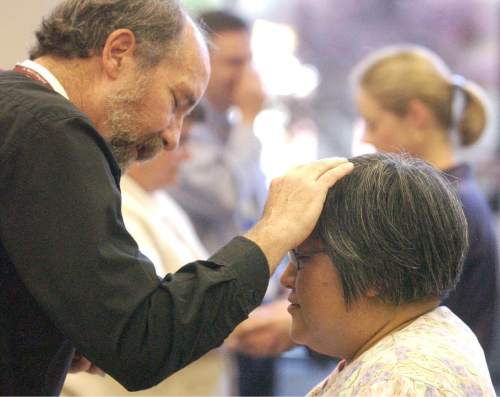This is an archived article that was published on sltrib.com in 2016, and information in the article may be outdated. It is provided only for personal research purposes and may not be reprinted.
On Feb. 16, the Rev. Lincoln Richard Ure III returned home from a morning run and said to his wife, "Take me to the hospital."
Arriving at St. Mark's Hospital, where he had served as a chaplain for 41 years, the Episcopal priest walked directly to the emergency-room window and said, "I need help."
And the nurse behind the glass ... laughed.
That's because, in the past, Ure often would joke, as if at a drive-thru, "I'll take a big Mac."
This time, though, the pain was real.
Ure had a ruptured spleen and nearly bled to death on the operating table. Though he survived the surgery, doctors discovered a rare disease (primary splenic angiosarcoma) that would kill him in just four months.
Father Ure — or Linc, as he was known to family and friends — died Friday at age 68.
Just after Ure's death, Utah's Episcopal bishop, the Rev. Scott B. Hayashi, kissed his friend's forehead and wept.
What made Ure stand out was the priest's "deep and open spiritual presence that invited others to open themselves to receive God's love and healing even if they did not consider themselves to be religious," Hayashi, coincidentally also missing a spleen, said in a statement. "That, coupled with his talent to teach and mentor others to do the same, made him the outstanding person that all who knew him will greatly miss."
Linc's wife, Maureen O'Hara Ure, was at her husband's side from their youth in east Salt Lake City until the moment of his death. They even ran away together as teens — she was an Irish Catholic and he an Episcopalian — with her father chasing them down the driveway.
Side by side, they protested the Vietnam War, roamed the Big Apple ("a radicalizing experience for both of us," she recalls), traveled the world, reared a daughter and reinvented themselves. She became an artist, he a priest (after earning a degree from the University of Utah in chemistry, he received his master of divinity in 1974 at New York's General Theological Seminary and was ordained a year later), with a profound commitment to social justice, ethics and the spiritual well-being of the sick and dying.
In the 1980s, Ure created the first Clinical Pastoral Education program in Utah and later helped establish the first hospice in the Beehive State.
In that pioneering work, her husband was on call 24-7, his widow said Monday. "There were no other chaplains."
"Linc's concern for others was never theoretical," his obituary stated. "Once, on the way to dinner downtown, he spotted a distraught stranger threatening to jump from a fire escape. Despite his fear of heights, Linc climbed several stories and dissuaded the man from committing suicide."
For that intervention, Salt Lake City's mayor gave him the Citizen's Courage Award. Ure later was named a "Health Care Hero" by Utah Business Magazine.
As Ure's health declined in recent months, he returned a couple of more times to the familiar halls of St. Mark's, where he was attended to by doctors and nurses who knew and loved him as a colleague and visionary.
He was gentle and tender with patients, his widow said, while being ferocious and aggressive in promoting their needs to administrators.
He was the "doting father" of Heather Ure Dunagan, the obituary added, "and besotted grandfather of Heather's four incredible children."
Funeral services will be at the Cathedral Church of St. Mark, 231 E. 100 South, on Wednesday at 1 p.m.
Twitter: @religiongal



